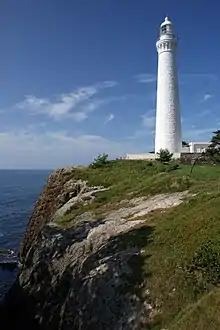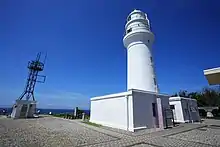 Shionomisaki Lighthouse | |
| Location | Cape Shionomisaki, Kushimoto, Japan |
|---|---|
| Coordinates | 33°26′15″N 135°45′16″E / 33.4375°N 135.7544°E |
| Tower | |
| Constructed | 1870 |
| Construction | stone |
| Height | 22.51 m (73.9 ft) |
| Shape | cylindrical tower with gallery and lantern |
| Markings | white (tower), white (lantern) |
| Operator | 5th Regional Coast Guard Headquarters |
| Light | |
| First lit | 15 September 1873 |
| Focal height | 49.47 m (162.3 ft) |
| Lens | first order Fresnel lens, second order Fresnel lens (1929–) |
| Intensity | 970,000 candela |
| Range | 19 nmi (35 km; 22 mi) |
| Characteristic | |
| Japan no. | JCG-2902[1] |
Shionomisaki Lighthouse (潮岬灯台, Shionomisaki tōdai) is a lighthouse located on Cape Shionomisaki, on the southern coast of Kii Peninsula in the Kansai region of Japan.[2][3] Administratively, it is within the town of Kushimoto, Wakayama Prefecture.
History
On June 25, 1866, the Tokugawa shogunate of Edo period Japan signed a customs and tax treaty with the United States, Great Britain, France, and the Netherlands to normalize trade relations, One of the stipulations of this treaty was that eight lighthouses be erected near the approaches to the treaty ports opened for foreign commerce.(Kannonzaki, Nojimasaki, Kashinozaki, Mikomotojima, Kusaki, Iojima, Cape Sata, and Shionomisaki). However, due to the Boshin War, work was not begun until after the Meiji restoration. The new Meiji government brought in foreign advisors to assist in the modernization efforts, one of whom was the British engineer Richard Henry Brunton who specialized in lighthouse design. Aside from the eight lighthouses stipulated by the treaty (i.e. the "treaty lighthouses"), Brunton went on to constructed another 25 lighthouses from far northern Hokkaidō to southern Kyūshū during his career in Japan.
Work on the Shionomisaki Lighthouse began in June 1870, and it was first lit on June 10, 1870 with a temporary lighting system. The original structure was a octagonal wooden building, and it was to have been the first western-style wooden lighthouse in Japan; however, the ship containing the light mechanism from the United Kingdom sank in the East China Sea en route to Japan, and Brunton was forced to improvise using the lantern from a steam locomotive instead. The main lighting equipment was repeatedly delayed, and it was not until September 15, 1873 that its intended light system was installed and declared operational.
The lighthouse was rebuilt in April 1878 with the current stone structure. In 1929, the lighting system was replaced with a second-class Fresnel immovable lens and an oil-evaporated incandescent lamp, and the system was electrified in 1938. This lamp was replaced with a 90-cm rotary lamp in 1957.
The lighthouse is within the borders of the Yoshino-Kumano National Park. The lighthouse is now operated by the Japan Coast Guard 5th Regional Headquarters
Gallery
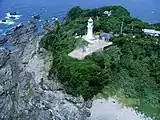 Aerial photograph of Shionomisaki Lighthouse
Aerial photograph of Shionomisaki Lighthouse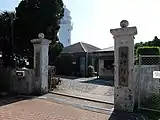 Entrance
Entrance Entrance to the lighthouse
Entrance to the lighthouse Interior of the lighthouse
Interior of the lighthouse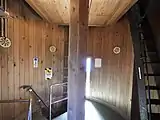 Interior of the lighthouse
Interior of the lighthouse 2nd degree Fresnel lens system
2nd degree Fresnel lens system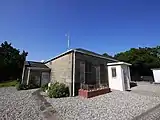 lightkeeper's house (also by Brunton)[4]
lightkeeper's house (also by Brunton)[4]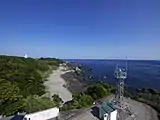 View from the lighthouse
View from the lighthouse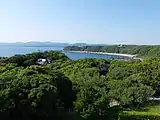 View from the lighthouse
View from the lighthouse
See also
References
- ↑ Rowlett, Russ. "Lighthouses of Japan: Southern Wakayama Prefecture". The Lighthouse Directory. University of North Carolina at Chapel Hill.
- ↑ Lighthouses of Japan
- ↑ Siono Misaki Lighthouses of Japan (in Japanese)
- ↑ "潮岬灯台官舎 建造物の詳細". 和歌山県教育センター学びの丘. Archived from the original on 2016-03-04. Retrieved 2015-06-08.
